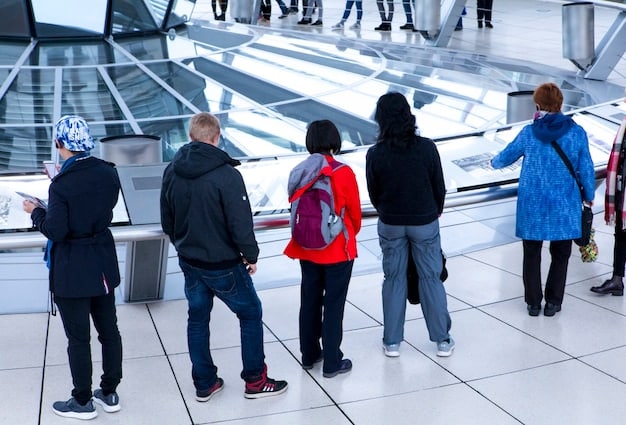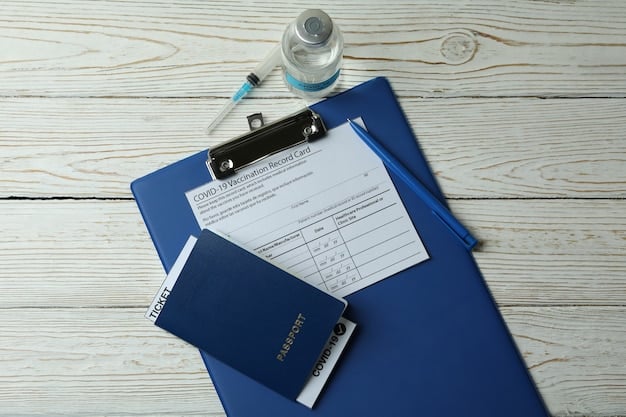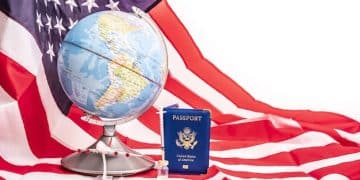US Customs and Border Protection: The Definitive Guide

This comprehensive guide provides essential information about US Customs and Border Protection (CBP), covering entry requirements, prohibited items, traveler programs, and tips for a smooth border crossing experience.
Planning a trip to the United States? Understanding the ins and outs of **The Complete Guide to US Customs and Border Protection: What You Need to Know** is crucial for a hassle-free entry. From declaring goods to knowing prohibited items, this guide will equip you with the knowledge you need.
Understanding US Customs and Border Protection (CBP)
US Customs and Border Protection (CBP) is the largest federal law enforcement agency of the United States Department of Homeland Security. Its primary mission is to keep terrorists and their weapons from entering the U.S. while also enforcing hundreds of U.S. laws and regulations.
Knowing the role and responsibilities of CBP can significantly improve your travel experience and ensure compliance with U.S. laws.
CBP’s Core Responsibilities
CBP’s responsibilities are broad and encompass various aspects of border security and trade enforcement. Key among these are:
- Enforcing customs, immigration, and agriculture regulations to prevent illegal entry of people and goods.
- Securing U.S. borders against terrorism and illegal activities.
- Facilitating lawful international trade and travel.
The Importance of CBP
The CBP plays a vital role in maintaining national security and economic stability. Its efforts impact everything from international trade to tourism, making it essential for travelers and businesses to understand its operations.

Entry Requirements for Foreign Visitors
Entering the U.S. as a foreign visitor involves several requirements that must be met to ensure a smooth and legal entry. These requirements vary based on your country of origin and the purpose of your visit.
Understanding these requirements and preparing accordingly is crucial to avoid delays or denials at the border.
Visa Requirements
Most foreign nationals require a visa to enter the U.S. The type of visa needed depends on the purpose of your visit, such as tourism, business, or education. A U.S. embassy or consulate in your home country issues visas after a thorough application process.
The Visa Waiver Program (VWP) allows citizens of participating countries to travel to the U.S. for tourism or business for stays of 90 days or less without obtaining a visa.
Required Documents
Upon arrival at a U.S. port of entry, you will need to present certain documents to the CBP officer. These typically include:
- A valid passport.
- A valid visa (if required).
- Form I-94 (Arrival/Departure Record), if applicable. This form can often be completed online prior to arrival, expediting the entry process.
Declaring Goods: What You Need to Know
When entering the U.S., you are required to declare all items you are bringing into the country. This includes goods purchased abroad and gifts received while traveling.
Accurate declaration is not just a legal requirement but also helps avoid potential penalties and delays.

What Needs to Be Declared
You must declare any items you acquired outside the U.S. and are bringing back, including:
- Gifts.
- Merchandise purchased at duty-free shops.
- Repairs or alterations made to items while abroad.
Currency Reporting
If you are carrying more than $10,000 in currency or monetary instruments into or out of the U.S., you must report it to CBP. This includes cash, checks, money orders, and other similar instruments. Failure to report can result in seizure of the funds and potential criminal charges.
Prohibited and Restricted Items
CBP enforces laws and regulations related to prohibited and restricted items to protect U.S. agriculture, public health, and national security. Certain items are not allowed to enter the U.S., while others are restricted and require special permits or documentation.
Understanding these restrictions is crucial to avoid potential issues at the border.
Common Prohibited Items
Some commonly prohibited items include:
- Certain fruits, vegetables, and plants.
- Meat products from specific countries.
- Counterfeit goods.
Restricted Items
Restricted items may require permits or special documentation for entry. Examples include:
Medications: Must be properly labeled and accompanied by a prescription if necessary.
Firearms: Subject to strict regulations and require permits from the Bureau of Alcohol, Tobacco, Firearms and Explosives (ATF).
Understanding CBP’s Traveler Programs
CBP offers several traveler programs designed to expedite the entry process for pre-approved, low-risk travelers. These programs can save you time and make your border crossing experience more efficient.
Enrolling in these programs can be particularly beneficial for frequent travelers.
Global Entry
Global Entry is a CBP program that allows expedited clearance for pre-approved, low-risk travelers upon arrival in the United States. Members can use automated kiosks at select airports and land border crossings. To enroll: apply online, undergo a background check, and complete an in-person interview.
SENTRI and NEXUS
SENTRI (Secure Electronic Network for Travelers Rapid Inspection) allows expedited vehicle processing for pre-approved, low-risk travelers entering the U.S. from Mexico and Canada. NEXUS is a similar program for entry from Canada. Both programs can significantly reduce wait times at land border crossings.
Tips for a Smooth Border Crossing Experience
To ensure a smooth and stress-free border crossing experience, it’s essential to be prepared and cooperative with CBP officers. Simple steps can make a big difference.
Being proactive and respectful can help avoid unnecessary delays or complications.
Be Prepared
Have all your necessary documents readily available, including your passport, visa (if required), and any declarations forms. Knowing your rights as a traveler and familiarizing yourself with CBP regulations can further assist in this process.
Answer Questions Honestly
Answer all questions from CBP officers truthfully and accurately. Providing false or misleading information can lead to serious consequences, including denial of entry and potential legal penalties.
| Key Point | Brief Description |
|---|---|
| 🛂 Entry Requirements | Valid passport and visa (if required) are essential for entry. |
| 📝 Declaring Goods | Declare all items acquired abroad to avoid penalties. |
| 🚫 Prohibited Items | Certain items like some fruits and counterfeit goods are not allowed. |
| 🚀 Traveler Programs | Global Entry and SENTRI offer expedited border crossing for pre-approved travelers. |
Frequently Asked Questions (FAQ)
▼
The VWP allows citizens of participating countries to travel to the U.S. for tourism or business for stays of 90 days or less without a visa. Travelers need to apply through the Electronic System for Travel Authorization (ESTA).
▼
You must report if you are carrying more than $10,000 in currency or monetary instruments. Failure to report can lead to penalties, including seizure of funds and potential criminal charges.
▼
Failure to declare an item can result in fines, penalties, and seizure of the undeclared items. It’s crucial to be honest and upfront about everything you’re bringing into the country.
▼
Some foods are allowed, while others are prohibited. Generally, cooked and commercially packaged foods are permissible. However, it’s best to declare all food items to the CBP officer for inspection.
▼
Enroll in CBP’s trusted traveler programs like Global Entry or SENTRI. These programs offer expedited clearance for pre-approved, low-risk travelers. This will save you valuable time at border crossings.
Conclusion
Navigating US Customs and Border Protection doesn’t need to be daunting. By understanding the requirements, declaring goods accurately, knowing prohibited items, and considering traveler programs, you can ensure a smooth and efficient entry into the United States. Staying informed and prepared is your best strategy for a successful border crossing.





